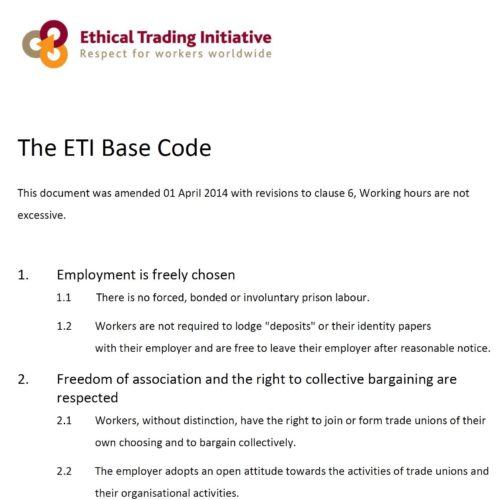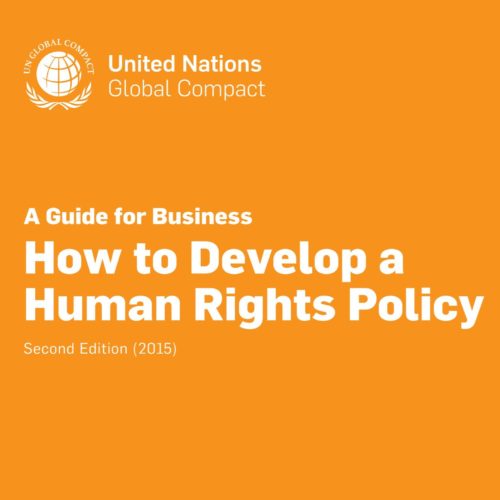-
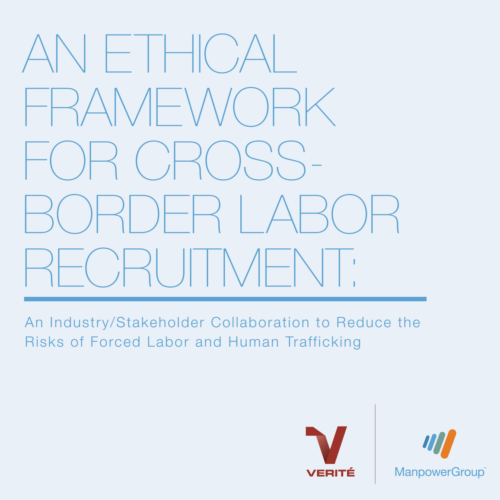 This Framework offers a checklist guide of specific Standards of Ethical Practice for firms involved in cross-border recruitment of workers, and outlines a Verification and Certification System designed to protect workers against specific patterns of vulnerability and abuse. The SEP include: - a checklist of operating rules for firms engaged in the cross-border recruitment and movement of workers The VCS outline includes: - an outline of elements and principles to be adopted by organisations that wish to measure, certify, and ensure compliance of particular enterprises with the SEP The Framework also details a list of recommendations which are informed by ManpowerGroups’s pragmatic experience in responsible cross-border recruitment of workers, and Verite’s expertise in creating verification systems to protect human rights. It is intended as the first phase in a three-phase project, the second phase is a demonstration project with interested groups, the third phase is the development and dissemination of results, assessments, further recommendations and supporting materials for the wider replication and adaptation of the Framework.
This Framework offers a checklist guide of specific Standards of Ethical Practice for firms involved in cross-border recruitment of workers, and outlines a Verification and Certification System designed to protect workers against specific patterns of vulnerability and abuse. The SEP include: - a checklist of operating rules for firms engaged in the cross-border recruitment and movement of workers The VCS outline includes: - an outline of elements and principles to be adopted by organisations that wish to measure, certify, and ensure compliance of particular enterprises with the SEP The Framework also details a list of recommendations which are informed by ManpowerGroups’s pragmatic experience in responsible cross-border recruitment of workers, and Verite’s expertise in creating verification systems to protect human rights. It is intended as the first phase in a three-phase project, the second phase is a demonstration project with interested groups, the third phase is the development and dissemination of results, assessments, further recommendations and supporting materials for the wider replication and adaptation of the Framework. -
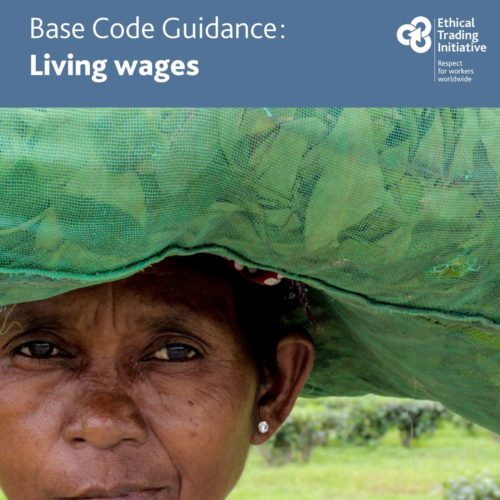 The Ethical Trading Initiative (ETI) is an alliance of companies, trade unions and NGOs that promotes workers' rights around the world. Through this guide, they share what companies can do to create the enabling conditions for the payment of living wages, in line with their commitment to the ETI Base Code. They outline their expectations of ETI members and provide guidance on winning senior executives’ support for living wages. The guidance includes practical steps for developing living wage strategies and collaborating with stakeholders to identify sustainable, scalable solutions. It also covers the vital question of how to offset the cost of increased wages, and includes the experience of ETI members.
The Ethical Trading Initiative (ETI) is an alliance of companies, trade unions and NGOs that promotes workers' rights around the world. Through this guide, they share what companies can do to create the enabling conditions for the payment of living wages, in line with their commitment to the ETI Base Code. They outline their expectations of ETI members and provide guidance on winning senior executives’ support for living wages. The guidance includes practical steps for developing living wage strategies and collaborating with stakeholders to identify sustainable, scalable solutions. It also covers the vital question of how to offset the cost of increased wages, and includes the experience of ETI members.Credit: Ethical Trading Initiative
-
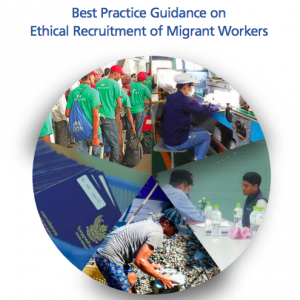 The ICCR is a coalition of faith-based investors. This guidance looks at emerging best practice trends in eight companies from high risk sectors, analysing their developments in corporate ethical recruitment policies and identifying gaps for improvement. The key learning points provided in the guidance can be used as a starting point for businesses to develop their own policies.
The ICCR is a coalition of faith-based investors. This guidance looks at emerging best practice trends in eight companies from high risk sectors, analysing their developments in corporate ethical recruitment policies and identifying gaps for improvement. The key learning points provided in the guidance can be used as a starting point for businesses to develop their own policies.Credit: Interfaith Center on Corporate Responsibility (ICCR)
-
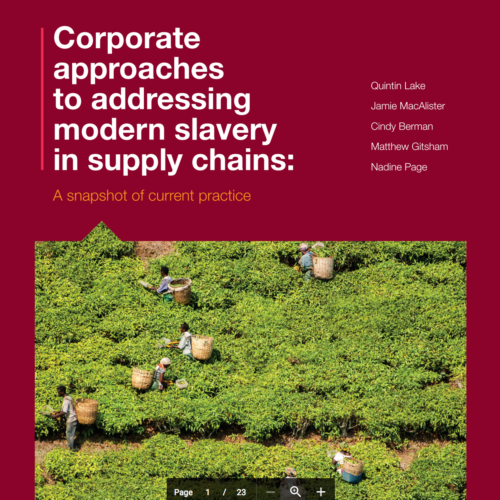 The ETI is an alliance of companies, trade unions and NGOs that promotes workers' rights around the world. This report is the outcome of interviews and surveys with 21 retailers and tier 1 companies across a range of sectors. It is intended to reflect current practice of companies regarding modern slavery and condenses findings into 10 key messages. It is not meant as formal guidance for the industry, but more to provide insight from both ETI and non-ETI members.
The ETI is an alliance of companies, trade unions and NGOs that promotes workers' rights around the world. This report is the outcome of interviews and surveys with 21 retailers and tier 1 companies across a range of sectors. It is intended to reflect current practice of companies regarding modern slavery and condenses findings into 10 key messages. It is not meant as formal guidance for the industry, but more to provide insight from both ETI and non-ETI members.Credit: Ethical Trading Initiative (ETI)
-
 Stronger Together is a multi-stakeholder initiative which aims to reduce modern slavery. It provides guidance, training and resources to organisations, employers, labour providers, workers and their representatives. This free collection of resources includes pragmatic guidance and toolkits, and resources for the workplace including multilingual posters, leaflets and template policies. This template is to be modified as required and for inclusion with a wider Tackling Modern Slavery in Business and Supply Chain or Business Human Rights Policy.
Stronger Together is a multi-stakeholder initiative which aims to reduce modern slavery. It provides guidance, training and resources to organisations, employers, labour providers, workers and their representatives. This free collection of resources includes pragmatic guidance and toolkits, and resources for the workplace including multilingual posters, leaflets and template policies. This template is to be modified as required and for inclusion with a wider Tackling Modern Slavery in Business and Supply Chain or Business Human Rights Policy.Credit: Stronger Together
-
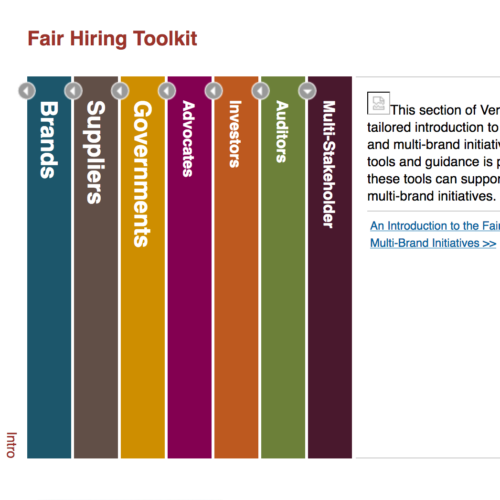 The Fair Hiring Toolkit is a resource which addresses fair hiring practice and responsible recruitment of migrant workers in global supply chains. It focuses on all levels of an organisation to tailor tools and advice appropriately and is a step-by-step process of how to implement trafficking-free supply chains. This includes providing a Framework for Action for brands and suppliers, and supplying guidance for governments, advocates, investors, auditors and other stakeholders. The Frameworks offer advice on: - Improving Codes of Conduct - Raising awareness and building capacity - Strengthening assessments and social audits - Taking corrective action & developing systems improvement plans - Reporting and transparency - Engagement with other actors - Public policy
The Fair Hiring Toolkit is a resource which addresses fair hiring practice and responsible recruitment of migrant workers in global supply chains. It focuses on all levels of an organisation to tailor tools and advice appropriately and is a step-by-step process of how to implement trafficking-free supply chains. This includes providing a Framework for Action for brands and suppliers, and supplying guidance for governments, advocates, investors, auditors and other stakeholders. The Frameworks offer advice on: - Improving Codes of Conduct - Raising awareness and building capacity - Strengthening assessments and social audits - Taking corrective action & developing systems improvement plans - Reporting and transparency - Engagement with other actors - Public policyCredit: Verite
-
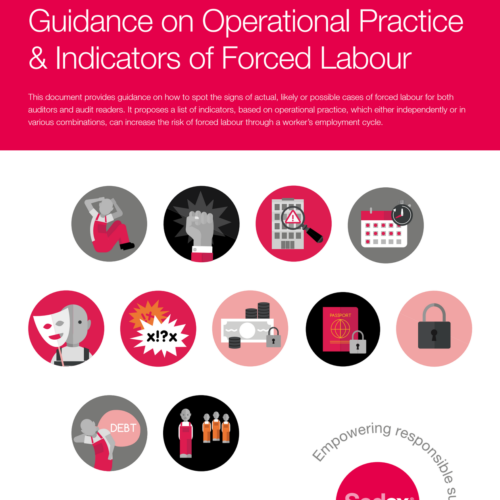 Sedex is a global NGO which provides the world's largest collaborative platform for sharing responsible sourcing data on supply chains. The Sedex Stakeholder Forum (previously the Associated Auditor Group) brings together brings together leaders across the ethical trade and responsible sourcing industry to discuss the challenges they collectively face and solve those problems collaboratively. This guidance provides information on how to spot signs of exploitation for auditors and audit readers. It includes a list of indicators of exploitation, based on operational practice, which can increase a person's risk to human trafficking. It also highlights the importance of protecting potential victims, and advises auditors on how to capture evidence and document potential exploitation of workers. It is intended for use by auditing bodies, ethical sourcing initiatives and brands to help them understand the risks of forced labour, and enhance their existing auditing protocols.
Sedex is a global NGO which provides the world's largest collaborative platform for sharing responsible sourcing data on supply chains. The Sedex Stakeholder Forum (previously the Associated Auditor Group) brings together brings together leaders across the ethical trade and responsible sourcing industry to discuss the challenges they collectively face and solve those problems collaboratively. This guidance provides information on how to spot signs of exploitation for auditors and audit readers. It includes a list of indicators of exploitation, based on operational practice, which can increase a person's risk to human trafficking. It also highlights the importance of protecting potential victims, and advises auditors on how to capture evidence and document potential exploitation of workers. It is intended for use by auditing bodies, ethical sourcing initiatives and brands to help them understand the risks of forced labour, and enhance their existing auditing protocols.Credit: Sedex
-
 Hedging Risk by Combating Human Trafficking: Insights from the Private Sector is designed to help companies share best practices so they can mitigate their risks and help eliminate this heinous practice. In this first of a series, we highlight insights and technology-driven interventions in the hospitality, finance, and transportation industries.
Hedging Risk by Combating Human Trafficking: Insights from the Private Sector is designed to help companies share best practices so they can mitigate their risks and help eliminate this heinous practice. In this first of a series, we highlight insights and technology-driven interventions in the hospitality, finance, and transportation industries.Credit: World Economic Forum
-
 Stronger Together is a multi-stakeholder initiative which aims to reduce modern slavery. It provides guidance, training and resources to organisations, employers, labour providers, workers and their representatives. This free collection of resources includes pragmatic guidance and toolkits, and resources for the workplace including multilingual posters, leaflets and template policies. This template is to be modified as required and for inclusion with a wider Tackling Modern Slavery in Business and Supply Chain or Business Human Rights Policy.
Stronger Together is a multi-stakeholder initiative which aims to reduce modern slavery. It provides guidance, training and resources to organisations, employers, labour providers, workers and their representatives. This free collection of resources includes pragmatic guidance and toolkits, and resources for the workplace including multilingual posters, leaflets and template policies. This template is to be modified as required and for inclusion with a wider Tackling Modern Slavery in Business and Supply Chain or Business Human Rights Policy.Credit: Stronger Together
-
 Stronger Together is a multi-stakeholder initiative which aims to reduce modern slavery. It provides guidance, training and resources to organisations, employers, labour providers, workers and their representatives. This free collection of resources includes pragmatic guidance and toolkits, and resources for the workplace including multilingual posters, leaflets and template policies. This template is to be modified as required and for inclusion with a wider Tackling Modern Slavery in Business and Supply Chain or Business Human Rights Policy.
Stronger Together is a multi-stakeholder initiative which aims to reduce modern slavery. It provides guidance, training and resources to organisations, employers, labour providers, workers and their representatives. This free collection of resources includes pragmatic guidance and toolkits, and resources for the workplace including multilingual posters, leaflets and template policies. This template is to be modified as required and for inclusion with a wider Tackling Modern Slavery in Business and Supply Chain or Business Human Rights Policy.Credit: Stronger Together
-
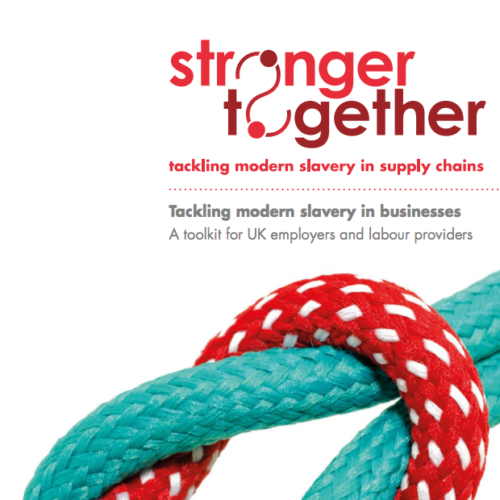 Stronger Together is a multi-stakeholder initiative which aims to reduce modern slavery. It provides guidance, training and resources to organisations, employers, labour providers, workers and their representatives. This free collection of resources includes pragmatic guidance and toolkits, and resources for the workplace including multilingual posters, leaflets and template policies. This template is to be modified as required and for inclusion with a wider Tackling Modern Slavery in Business and Supply Chain or Business Human Rights Policy.
Stronger Together is a multi-stakeholder initiative which aims to reduce modern slavery. It provides guidance, training and resources to organisations, employers, labour providers, workers and their representatives. This free collection of resources includes pragmatic guidance and toolkits, and resources for the workplace including multilingual posters, leaflets and template policies. This template is to be modified as required and for inclusion with a wider Tackling Modern Slavery in Business and Supply Chain or Business Human Rights Policy.Credit: Stronger Together
-
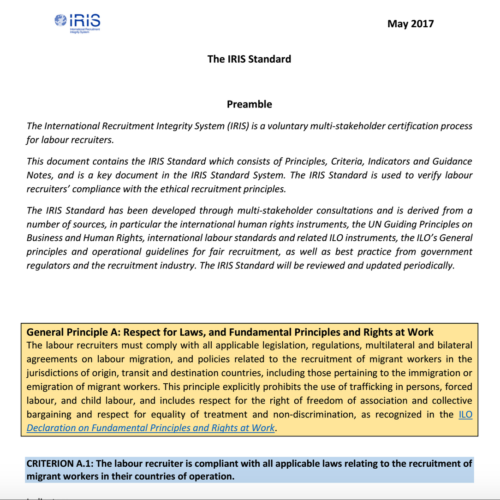 The International Recruitment Integrity System is a voluntary, multi-stakeholder certification system seeking to implement ethical recruitment standards. The Code of Conduct was established by IRIS as part of these efforts. There are 2 General Principles: Respect for Laws, and Fundamental Principles and Rights at Work Respect for Ethical and Professional Conduct It includes 5 Principles:
The International Recruitment Integrity System is a voluntary, multi-stakeholder certification system seeking to implement ethical recruitment standards. The Code of Conduct was established by IRIS as part of these efforts. There are 2 General Principles: Respect for Laws, and Fundamental Principles and Rights at Work Respect for Ethical and Professional Conduct It includes 5 Principles:- prohibition of recruitment fees to jobseekers
- respect for freedom of movement
- respect for transparency of terms and conditions of employment
- respect for confidentiality and data protection
- respect for access to remedy
Credit: International Recruitment Integrity System (IRIS)
-
 This guide provides support for hotel owners to uphold and protect human rights in their business and understand risk areas. It includes information and case studies about risk areas, tools and instruments to help companies adhere to the law and implement good practice, and a step-by-step guide for companies to meet the responsibility to respect human rights.
This guide provides support for hotel owners to uphold and protect human rights in their business and understand risk areas. It includes information and case studies about risk areas, tools and instruments to help companies adhere to the law and implement good practice, and a step-by-step guide for companies to meet the responsibility to respect human rights.Credit: University of Liverpool

